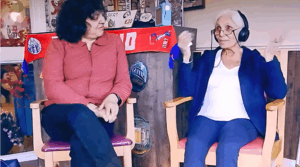
A Focus on the Reminiscence Bump (Part 1).
As part of Music for my Mind’s aim to raise awareness about musical therapy in dementia care, and our new Playlist Creation Tool designed to make waves in that field, we have decided to put out a series of blog posts to explain a bit about one element of the research we have been doing over the last year, “A Focus on the Reminiscence Bump to Personalise Music Playlists for Dementia” published by The Journal of Multidisciplinary Healthcare.
To begin, let’s tell you a bit about who we are and what we do. Music for my Mind is a charity (registered number 1167246) based in England and set up in 2016 with the express purpose of improving the lives of those living with memory loss and dementia through music. There are probably millions of examples of the role of musical therapy in dementia care, from the famous remark of Professor Oliver Sacks that:
to the dozen or so articles a week in the papers. Everywhere you hear of music’s transformational ability in care, but for our charity the seed of this idea was planted many miles away in Uganda, in the mind of our esteemed chairman and founder Keith McAdam, Emeritus Professor at the London School of Hygiene and Tropical Medicine.
Out in Uganda, where Keith ran an Infectious Diseases Institute during the height of the HIV epidemic, he came up with a five part Creativity Initiative for the clinic caring for his patients: Art, Games, Spiritual and Social Support, Business and Music. The last of these was a runaway success, to the extent that after a distinguished career in academia in London, Keith decided to create a charity which used music as care in a place it was needed most: those living with dementia. More than 850,000 people live with dementia in the UK, (about 1 in 6 people over the age of 80), and care for these people and their families, already challenging, has become incredibly difficult over the last year.

Now, despite the acres of anecdotal evidence floating around, the videos, articles, stories and songs, actually proving the positive emotional effect of musical therapy on those living with dementia is challenging, especially when it has to be proven to the already stretched and strained NHS and their associate/ gatekeeper, NICE (the National Institution for Health and Care Excellence). This is where Music for my Mind seeks to step in, helping not only practically in care homes, but publishing peer-reviewed research to create an evidence base for musical therapy, a dossier of sorts to get NICE to play nice. Keith is adamant that every assumption should be tested and proven beyond reasonable doubt, with the long term goal of a structured and universal UK-wide care program.
And proving everything is a task. One of the first assumptions all of us would make, when choosing a playlist for someone with dementia, is that they might like music from when they were young. Sounds sensible, doesn’t it? Perhaps a bit bland as these things go, uninspiring, not great on the side of the bus, but surely not something that can be really argued with. Well, it turns out it can, and it was up to two students from UCL (with an enormous amount of help from the Music for my Mind associates) to try and prove it. Stay tuned to hear about the next step in this project…






